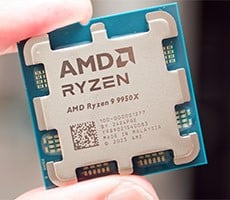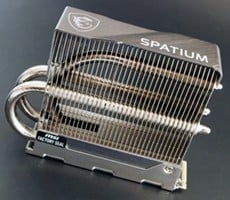Ryzen 9 9950X And 9900X Review: AMD’s Flagship Zen 5 Chips Tested
AMD Ryzen 9 9950X & 9900X: Class-Leading Performance With Enhanced Efficiency And Lower Pricing

| AMD Ryzen 9 9900X - $499, Ryzen 9 9950X - $549 AMD's enthusiast-class Ryzen 9 9950X and Ryzen 9 9900X are the highest performance Zen 5 processors in the line-up, and we've got the full scoop.
|
|||

|

 |
||
AMD’s launch plans for its Ryzen 9000 series of desktop processors based on the Zen 5 architecture didn’t go quite to plan, but as of today, the initial line-up is complete. Last week, we posted our take on the more mainstream Ryzen 5 9600X and Ryzen 7 9700X, six and eight-core processors, and today we get to play with their top-end Ryzen 9-branded counterparts. The flagship AMD Ryzen 9 9950X 16-core and Ryzen 9 9900X 12-core processors launch today, and we’ve got a full set of numbers to share.
These higher-end Ryzen 9-branded parts differ from the Ryzen 5 9600X and Ryzen 7 9700X in a few meaningful ways, which we’ll get to shortly. All of the processors are based on the same architecture and are compatible with the exact same platform and cooling hardware, but there are a handful of subtleties that differentiate these processors from their counterparts. Their specs tell much of the story, so let’s start off there...
The AMD Ryzen 9000 Series Processor Line-Up

Find AMD Ryzen 9000 Series Processors @ Amazon
If you read our earlier coverage of the Ryzen 9000 series, you'll know AMD made some tweaks to the TDPs for these processors. Unlike previous-gen Ryzen desktop processors, the two mainstream Ryzen 5 and 7 chips arrive with only 65W TDPs. Previously, TDPs that low were reserved for the “non-X” branded parts. The Ryzen 9 9900X has a relatively modest 120W TDP -- which is 50 watts lower than the 7900X -- and the top end Ryzen 9 9950X is 170W. As is the case with all Ryzen desktop processors, all of these parts are fully unlocked for easier, more flexible overclocking.
Base and boost clocks also differ between the processors, and they're not the same as the Ryzen 7000 series processors either. For example, a Ryzen 9 9950X will offer a 5.7GHz boost clock with a 4.3GHz base clock; that base clock is actually 200MHz lower than Ryzen 9 7950X. The Ryzen 9 9900X has the same 5.6GHz boost clock as the 7900X, but a 300MHz lower base clock. Those may sound like big differences, but in the real world, those base clocks don’t often come into play, and Zen 5's Instructions-per-Clock (IPC) is higher than Zen 4, which should help in many workloads.
As you’d expect, cache sizes also differ between the various Ryzen 9000 series processors, with the flagship 9950X offering up to 80MB of combined L2+L3 cache, while the mainstream Ryzen 5 9600X clocks in at 38MB, and the 9900X and 9700X sit in between. The single-CCD Ryzen 5 9600X and Ryzen 7 97000X have 32MB of L3 available, but the dual-CCD Ryzen 9 chips we'll be showing you here today both have 64MB of L3, hence the much larger total cache on the higher-end parts.
Introducing The Ryzen 9 9950X & 9900X
Although they feature a new compute die manufactured on TSMC’s 4nm process node versus previous-gen Ryzen 7000 series processors, externally the AMD Ryzen 9950X and Ryzen 9 9900X look identical to thier cousins -- save for the branding and model numbers on thier integrated heat spreaders, of course. The Ryzen 9000 series features the same heat spreader design and obviously the same LGA design with 1,718 pads for Socket AM5. As such, the Ryzen 9000 series is compatible with all of the same coolers and AMD 600-series chipset-based motherboards, provided said motherboard has received the necessary BIOS/UEFI update. Newer AMD 800-series chipsets are also coming, but they are slated to arrive a little later in the year.
The Ryzen 9 9900X and 9950X both shipped is small, slim, boxes that are a bit more svelte than previous-gen processors. None of the new chips will include a heatsink in their retail boxes, however, but they do include Ryzen 5/7/9 decals, a protective case for the processor, and a basic lit pack with warranty information.
AMD Ryzen 9 9950X and 9900X CPU-Z Details
The actual processor packages here resemble every other Socket AM5 chip in terms of physical dimension and design. Save for the info etched on top, the heat spreader and packaging remain unchanged from the previous-gen Ryzen 7000 series. A quick glance at CPU-Z, however, reveals the main differences...As you can see in the CPU-Z screenshots above, there is 80K of L1 per core (48K D-Cache [12-way] + 32K I-Cache [8-way]), which is an increase from 64K on Zen 4 / Ryzen 7000. There’s also 1MB of L2 cache per core, which is 16-way set associative. The L1 D-cache and L2 on Zen / Ryzen 7000 were both 8-way set associative. There’s also 32MB of L3 cache per compute die, for 64MB total on these two, dual-CCD processors. AMD's lower-end Ryzen 5 and Ryzen 7 processors feature only one compute chiplet + IO die, so they'll have a total of 32MB of L3, and the total amount of L1 and L2 scales accordingly with the number of cores.













